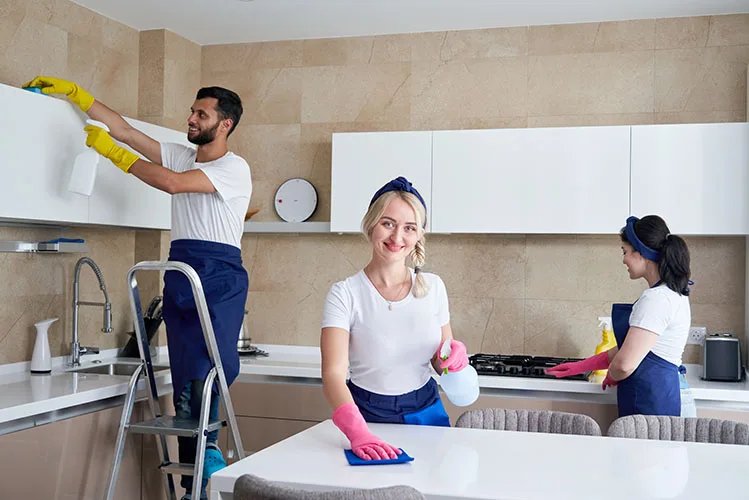Moving out isn’t exactly a holiday. Between the mountain of boxes, logistics, and the emotional rollercoaster of leaving an old home behind, cleaning often ends up last on our priority list.
But it’s the one detail that decides whether your landlord will wave you off with a smile or you’ll wave goodbye to your bond.
With the right strategy, you can sidestep the traps that trip up most tenants. Stick around, because we’re about to show you how to make end-of-lease cleaning a whole lot easier.
1. Skipping the Pre-Cleaning Checklist
If you think you can clean your rental in one day without a plan, you’d be making a big mistake. In fact, that’s how ovens get forgotten, windows stay streaky, and somehow the skirting boards escape untouched, until your landlord spots them in two seconds flat.
A solid checklist is your golden ticket to staying on top of things and ditching double work. Start by noting down the main areas, like the appliances, windows, and dusty corners, tailoring the list to your place.
Want to feel extra organised? Break tasks down by room, difficulty level, or even the gear you’ll need.
Not only will this make the whole process less intimidating, but there’s also something satisfying about ticking things off as you go.
Whether you prefer apps or scribbling in an old-school notebook, a checklist is your secret weapon for staying on track.
2. Neglecting Professional Help
Sometimes, hard work alone doesn’t cut it. Some chores, like upholstery and carpet cleaning, need a professional touch, since they require specialised equipment you probably don’t have at home.
The truth is, doing it alone can backfire. If you scrub too hard, use the wrong product, or drown your carpet in water, you’ll end up with damage that costs hundreds to reverse – not exactly the savings you were hoping for.
That’s where bond cleaning services shine. Sure, they feel pricey upfront, but the payoff is huge. Their intervention will save you countless hours and help you meet your property manager’s standards.
And honestly, outsourcing the tough tasks is one of the most stress-free decisions you’ll make during your entire move. But before you commit to a company, though, do a bit of research, pick a reputable local service, and budget for it early.
3. Using the Wrong Supplies
Not all cleaning products are a good match for every surface. Wood, for instance, requires gentle care, while glass tolerates stronger formulations. So, if you mix them up, it can cause stains, warps, or worse.
It’s not all doom and gloom, though. Here are some solutions and tools that are safe for most surfaces:
Eco-Friendly and Safe Cleaners
Going green doesn’t mean sacrificing results. In fact, natural options often crush it without the toxic side effects.
Vinegar, baking soda, and lemon juice are powerful cleaning agents. You can also add a drop of essential oils to neutralise odours and disinfect surfaces naturally.
While they’re mostly gentle and the margin of error is slim, you should still test them on a small patch first to avoid surprise disasters later.
Gentle Tools
A flimsy rag and a half-dried sponge aren’t going to cut it when you’re tackling a full rental clean. Instead, switch to microfibre cloths to scoop up grime that old-school rags miss.
You should also make sure you have a sturdy mop and a decent vacuum that won’t spit crumbs back onto your carpet.
These basics will save you time, energy, and frustration when the clock is ticking down to inspection day.
4. Overlooking High-Traffic Areas
High-traffic areas tend to wear down quickly. Hallways, kitchens, and bathrooms get constant use, so they show the effects much sooner.
There are other places that need your attention, too. Doorways have a way of collecting grime without anyone noticing. With hands brushing past, bags knocking against the frame, and shoes scuffing the edges, the dirt builds up there faster than you’d expect.
So, what can you do? Vacuum or mop the floors regularly, wipe the door frames and switches, and clean those grimy kitchen and bathroom corners often to stop them from turning into inspection-day nightmares.
This means less scrubbing when you’re about to move out, fewer awkward surprises, and a much better chance of getting your full bond back.
5. Ignoring the Importance of Ventilation
Good ventilation keeps mould, mildew, and bad smells from turning your space into a biohazard zone, especially in steamy kitchens and bathrooms.
When air gets stuck, bacteria and mould move in fast. To avoid this and get rid of extra moisture, open the windows and let the breeze do the heavy lifting.
You can also switch on the fans to keep the air circulating. And don’t forget the bathroom exhaust fans – those little vents need cleaning, too, if you actually want them to do their job properly.
If the air is still and things won’t dry, air purifiers and dehumidifiers can help. They extract excess moisture from particularly damp areas, keeping things dry and hygienic.
Finally, if you’d rather not mask your hard work with a can of artificial ‘ocean breeze,’ a few drops of essential oil in the mix can leave your place smelling fresh without the chemical haze.
6. Failing to Document Everything
Want your full deposit back? Show them the receipts in pixels. Snapping photos is probably the most underrated move-out hack you can rely on.
Before-and-after pics speak louder than any back-and-forth. So, organise everything in tidy digital folders so you’re never caught off guard.
Don’t forget to record pre-existing damage as well, like scratches on the floor, minor wall marks, or any quirks the property already had. You can also keep some video walkthroughs to leave zero room for debate.
On top of that, save any receipts to prove that you had the place professionally cleaned if it’s a requirement.
Sharing them with your landlord will show that you were serious about leaving the rental spotless, not just improvising and hoping for the best.
Conclusion
Moving out doesn’t have to be a frantic mess or a last-minute scramble. All you need to do is treat cleaning like part of the exit plan, not an afterthought.
So, keep it sharp, keep it smart, and handle the details like you’ve done it all before. Because when the dust settles (literally), it will feel good to walk away knowing that you’ve nailed it.






